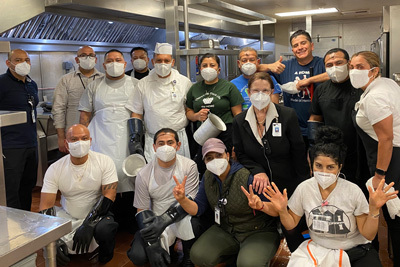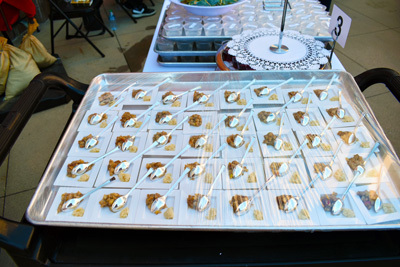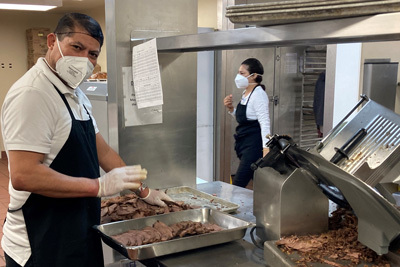What Makes Meals Marvelous at the Los Angeles Jewish Home


What Makes Meals Marvelous at the Los Angeles Jewish Home
The Los Angeles Jewish Home sparkles on every level, but one of its crown jewels is the Dietary Department, a collection of remarkable staff members who work tirelessly to keep Jewish Home residents happy, healthy, and able to enjoy some of life's finer pleasures. During holidays and every day, the approximately 60 employees based on the Grancell Village campus and 45 at Eisenberg Village are on their feet—and on their toes—making sure they deliver our seniors the very best cuisine possible.

It is, notes department director Cindy Cordon, a massive and ambitious enterprise. "We serve nearly 500 residents in 12 different locations on two campuses, plus we have Gerald's Deli and Café Rendezvous (the on-campus, to-go locations at Grancell Village and Eisenberg Village, respectively), and everything—except for blintzes and pies—are made from scratch," she says. "We have cooks and sous chefs and bakers who make fresh desserts for residents on both campuses, as well as challah every Friday. We have food preparers, dessert preparers, platers, and even someone dedicated to making purees for the seniors. It takes a lot of love and care to keep it all going!"

That love, says Chief Mission Officer Rabbi Karen Bender, is always on full display. "You just have to taste the food and look at the presentation to know the dietary staff does everything with such wonderful intention. The kitchen is the heart of any Jewish home, and that's also true at our Jewish Home. The people who cook and serve food to our residents are so loving in their preparation. As a rabbi, their sincerity, conscientiousness, and care are beautiful to watch."
Cindy, a certified specialist in gerontological nutrition, has been at the Jewish Home for 15 years. As she tells it, success on the job has meant mastering the art of menu planning. "Menu is the center of everything," she says. "It dictates what's required, from food and equipment to quantity and labor. It's also key for resident satisfaction. We have monthly food committees so we can get feedback from residents, and we incorporate as many of their requests as possible. We're honored they've placed their trust in us, and we want to make sure they feel listened to."
Under Cindy's direction, the Jewish Home menu is built on a five-week cycle that rotates seasonally. "We want residents to enjoy a wide variety of tastes, and we are constantly evaluating whether something worked or not," she says. To that end, she is frequently revising meals on the fly. "Out of 14 lunches and dinners, I may end up changing half, based on how people respond. We also send menus to the families of some of our residents, who help us customize meals according to their loved ones' individual needs. In total, we have about 56 customized menus!"
It's a lot to keep track of and gets even more complicated during Jewish holidays like Passover. Although the Jewish Home's kitchens are fully kosher for year-round food preparation, they must undergo a special process to make them kosher l'Pesach (kosher for Passover).
"We kasher the kitchen two days before the first seder. Everything is removed. Then we do a deep clean, from floor to ceiling. At Grancell Village this year, we spent approximately 20 hours on the floor alone! We turn on all the stoves and put everything that holds water on high until it's boiling, and then let it boil for two hours. Then we dip all the silverware in boiling water. After that, we scoop, splash, and pour water on every working surface throughout the kitchen, as well as the deli," Cindy says.

The entire process is supervised by a mashgiach—an authority on maintaining the kashrut status of a kosher establishment. "Our mashgiach says the Jewish Home has the most expert staff at kashering for Passover he's ever worked with, which is high praise," Rabbi Bender says. "They really do an extraordinary job."
It's a job Cindy and her staff are thrilled to do. "The Jewish Home is such a special place," she says. "The residents are so amazing. I've created a lot of meaningful relationships here. And I love serving them! Walking around in the dining room, getting a chance to talk to them, to find out how they are and to hear about their lives—it's a real privilege."